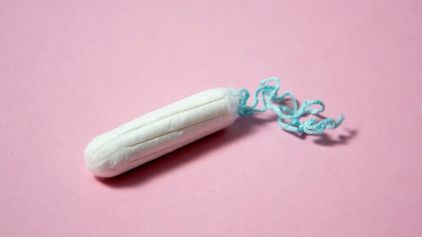Free Tampons for Everyone
By Stassa Edwards | March 2, 2016

Last month, New York Assemblywoman Linda Rosenthal introduced a bill to end the state’s sales tax on tampons and other menstruation products. The tax, Rosenthal said, is “a regressive tax on women and their bodies.” If the bill passed, New York state would become only the 11th state that currently doesn’t tax tampon and other sanitary products. But now, an increasing number of advocates are arguing that—not only should tampons be untaxed—but they should be free.
The New York Times reports that New York City Councilwoman Julissa Ferreras-Copeland has initiated a new program that installs a free tampon machine in the girls’ restroom at the High School for Arts and Business in Corona, Queens. The program is a pilot for now, but Ferreras-Copeland hopes that eventually all of the NYC’s middle and high schools will have the machines.
Similar programs are being considered in Wisconsin where legislators have proposed free products in all public buildings, a proposal that includes schools. In Columbus, Ohio, Councilwoman Elizabeth Brown has introduced legislation that would make sanitary products free in city-owned parks, as well as schools.
“Girls who get their period shouldn’t have to go to the nurse’s office,” Brown told the Times. “The underlying message with that is, ‘something’s wrong with me.’ Certainly we can all agree that having your period is not a monthly illness.” The Times reports:
The New York Times reports that New York City Councilwoman Julissa Ferreras-Copeland has initiated a new program that installs a free tampon machine in the girls’ restroom at the High School for Arts and Business in Corona, Queens. The program is a pilot for now, but Ferreras-Copeland hopes that eventually all of the NYC’s middle and high schools will have the machines.
Similar programs are being considered in Wisconsin where legislators have proposed free products in all public buildings, a proposal that includes schools. In Columbus, Ohio, Councilwoman Elizabeth Brown has introduced legislation that would make sanitary products free in city-owned parks, as well as schools.
“Girls who get their period shouldn’t have to go to the nurse’s office,” Brown told the Times. “The underlying message with that is, ‘something’s wrong with me.’ Certainly we can all agree that having your period is not a monthly illness.” The Times reports:
Tampons and pads should be treated just like toilet paper — they’re the equivalent,” said Nancy Kramer, an entrepreneur from Columbus, Ohio, who started Free the Tampons, a campaign to make feminine products accessible in all restrooms. She said the cost of stocking restrooms at a school or business with sanitary supplies works out to $4.67 per girl per year. “Menstruation is a normal bodily function, and it should be treated like that.”
The low cost of providing sanitary to supplies to girls and women is striking, particularly when a package of tampons averages between $7-$10, plus tax, per month. That cost is a particular burden to families living in poverty. The Times notes that FEMA didn’t cover the cost of sanitary products for homeless women until this year (a program that will go into effect in April) even though it covered other necessities like soap and toothpaste.
That oversight, corrected by Representative Grace Meng (D-NY), seems largely accidental, the result of programs run by men who weren’t thinking of sanitary necessities along gender-based lines. “Menstrual products should not be treated as luxury items,” Meng told the Times. Meng has also introduced federal legislation, the Fund Essential Menstruation Products Act, that would allow women to purchase hygiene products with pre-tax flexible spending accounts.
Though there has been a push from (largely female) legislators to end the unfair tax on tampons and related products, similar legislation has fared unevenly. Recently, Utah rejected a proposal that would end taxes on both tampons and diapers and internationally, the United Kingdom recently declined to end the 5% VAT tax on sanitary products.
Whether or not the spate of new bills will be successful is hard to say. But Chris Bobel, president of the Society for Menstrual Cycle Research, told the Times that the public discussion itself was a sizable shift: “The message to women has been: ‘Menstruation is your problem, ladies. Your job is to render it invisible.’” Certainly the public acknowledgment that the purchase and taxing of sanitary products is a fundamental marker of economic inequality is a baby step towards rendering it visible.
View original article
That oversight, corrected by Representative Grace Meng (D-NY), seems largely accidental, the result of programs run by men who weren’t thinking of sanitary necessities along gender-based lines. “Menstrual products should not be treated as luxury items,” Meng told the Times. Meng has also introduced federal legislation, the Fund Essential Menstruation Products Act, that would allow women to purchase hygiene products with pre-tax flexible spending accounts.
Though there has been a push from (largely female) legislators to end the unfair tax on tampons and related products, similar legislation has fared unevenly. Recently, Utah rejected a proposal that would end taxes on both tampons and diapers and internationally, the United Kingdom recently declined to end the 5% VAT tax on sanitary products.
Whether or not the spate of new bills will be successful is hard to say. But Chris Bobel, president of the Society for Menstrual Cycle Research, told the Times that the public discussion itself was a sizable shift: “The message to women has been: ‘Menstruation is your problem, ladies. Your job is to render it invisible.’” Certainly the public acknowledgment that the purchase and taxing of sanitary products is a fundamental marker of economic inequality is a baby step towards rendering it visible.
View original article
